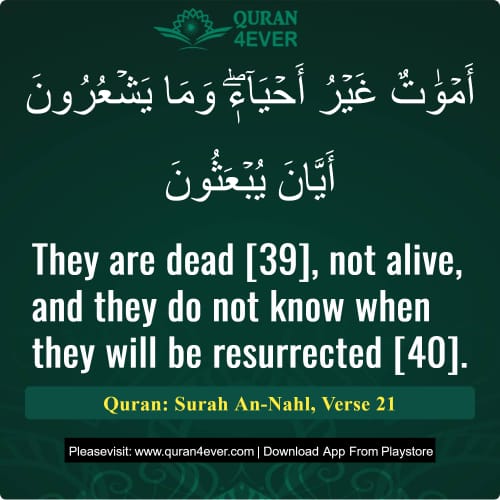
Transliteration:( Amwaatun ghairu ahyaaa'inw wa maa yash'uroona aiyaana yub'asoon (section 2) )
"They are dead [39], not alive, and they do not know when they will be resurrected [40]."
This verse refers specifically to the idols worshipped by the Arab polytheists, such as trees, stones, and carved statues—lifeless objects which they revered as gods. It does not refer to Prophets like Hazrat Isa (on whom be peace) or Hazrat Uzair (on whom be peace), whose noble statuses and divinely granted attributes are affirmed in other parts of the Qur’an.
Even the angels and martyrs are excluded from this verse. Regarding martyrs, Allah says:
"And say not of those who are killed in the path of Allah as dead" (S2:V154).
Therefore, including Prophets in the scope of this verse is incorrect and misleading.
The verse further explains that these idols are lifeless and unaware—they do not know about your present acts of worship, nor are they aware of your future resurrection.
To worship such ignorant, powerless, and lifeless entities—who neither hear nor respond, and who will not even know when the Day of Judgment arrives—is an act of sheer foolishness and misguidance. The verse encourages reflection on the absurdity of idol worship and urges the turning of devotion solely to the Living, All-Knowing Creator.
The tafsir of Surah An-Nahl verse 21 by Ibn Kathir is unavailable here.
Please refer to Surah Nahl ayat 19 which provides the complete commentary from verse 19 through 21.
(16:21) they are dead, not living. They do not even know when they will be resurrected.[19]
19. The words employed here to refute man made deities clearly indicate that these deities were deceased prophets, saints, martyrs and pious and other extraordinary beings buried in their graves and not angels, jinns, devils or idols. For the angels and devils are alive: therefore, the words, “They are dead, not living” cannot apply to them, and it is out of the question to say about idols of stone or wood that “They do not know at all when they shall again be raised to life” in the Hereafter. As regards the objection to this version that there were no such deities in Arabia, this is based on the lack of knowledge of the history of the pre- Islamic period. It is well known that there was a large number of Jews and Christians living among many clans of Arabia, who used to invoke and worship their Prophets, saints, etc. It is also a fact that many gods of the mushriks of Arabia were human beings, whose idols they had set up for worship after their death. According to a tradition cited in Bukhari on the authority of Ibn Abbas: “Wadd, Sua, Yaghuth, Yauq, and Nasr were pious human beings, whom the succeeding generations had made gods.” In another tradition, related by Aishah: “Asaf and Nailah were human beings.” There are also traditions to the same effect about Lat, Munat and Uzza. So much so that according to some traditions of the mushriks, Lat and Uzza were the beloved ones of Allah who used to pass His winter with Lat and summer with Uzza. But Allah is absolutely free from such absurd things they attribute to Him.
[695]- i.e., inanimate or without understanding.

For a faster and smoother experience,
install our mobile app now.
Related Ayat(Verses)/Topics